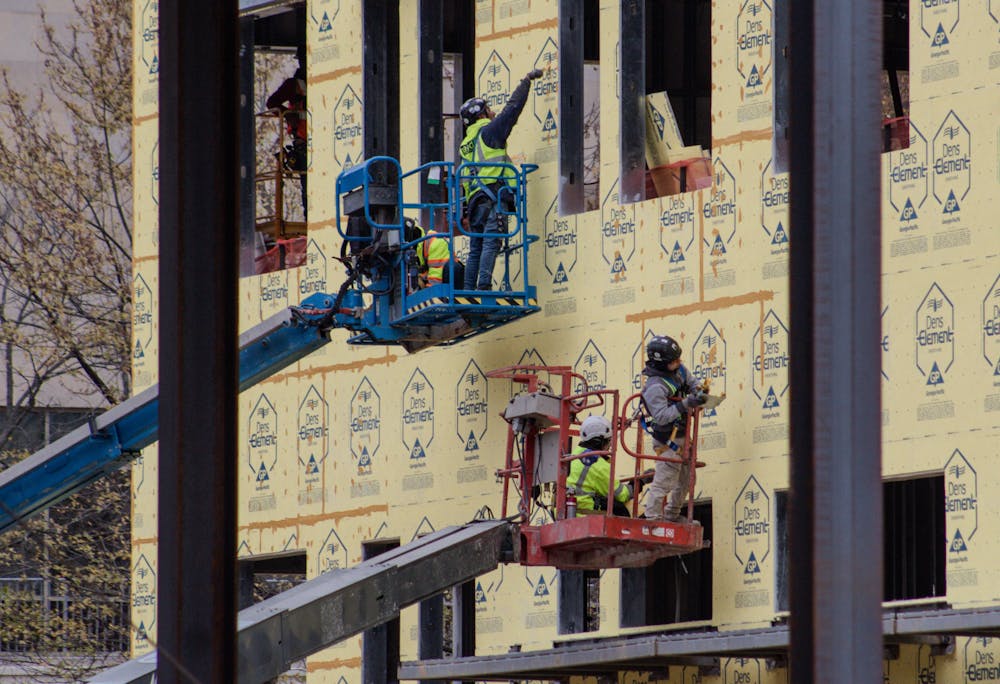From the Newsstands: This story appeared in The Eagle's December 2024 print edition. You can find the digital version here.
Construction of the Alan and Amy Meltzer Center for Athletic Performance — along with the renovation of athletic facilities directly adjacent — is underway at American University. Over the course of the school year, the project will displace several of American’s athletic programs, including soccer, track and field, club tennis and more.
The new athletic center aims to enhance facilities for athletes and offer more wellness options
for students. While University officials hope it will become an on-campus hub, many non-athletes remain indifferent, seeing it as an investment that primarily benefits varsity athletes.
Some students who don’t participate in athletics at AU, like School of Communication senior Lily Tierney, are unsure of how the Meltzer Center will benefit them and are upset about the amount of money going into it.
However, she said most people don’t know it was the result of a named fund, and that more communication would ease students' frustration.
“I don’t know if it’ll be worth it,” Tierney said. “I hope so, but going off of AU’s history, I feel like they overpromised, and will under-deliver.”
The University officially broke ground on the Meltzer Center in March and construction is on schedule with a completion date of the spring 2026 semester, according to Associate Athletic Director David Bierwirth. Reeves Field and the surrounding Greenberg Track are set to begin a $1.5 million renovation in December.
“We're creating an entirely new field — new irrigation, new turf, new drainage,” Bierwirth said.
According to Bierwirth, the University and its partner, DAVIS Construction, hoped to complete the renovation over the past summer, but there were delays due to other projects and permitting.
As a result, The University's varsity soccer programs do not have full access to Reeves.
Both men’s and women’s soccer are currently playing all home games at the Maryland SoccerPlex, about 40 minutes away from campus.
Track and field will not have access to the track during the spring, posing difficulties during their main season. They plan to divert practices to a local high school, according to head coach Sean Graham. The construction doesn’t just affect varsity athletes; many club sports have been displaced.
Some, like the running club, will only be disrupted temporarily. The club hosts its biggest annual fundraiser, Capital Relays, in the spring. Without the track, it must find an alternative location for its fundraisers and practices, according to member Isaac Ager.
For other clubs, the creation of the Meltzer Center poses much bigger problems.
After the tennis courts were demolished for construction, AU’s club tennis team has struggled to hold practices. Private courts in the area have not been interested in renting their spaces out, so the team has resorted to using public courts.
The problem with this, according to the club’s president Jose Calvo, is that they can only book one public court at a time.
“We can’t have 90 people trying to practice in one court,” he said.
The club used to maintain a “social team” of players who wanted to play tennis, but not compete in matches. However, without sufficient court space, it was forced to cut these members to make room for the competitive players. Others quit because the club hasn’t been able to secure
consistent practice times as they search for public courts.
“They were not interested in practicing off-campus with such an unsure schedule,” Calvo said.
According to Calvo, there’s no fixed solution for what the club can do moving forward. He said the University has no official plans to rebuild the tennis courts.
University officials and athletics staff say the Meltzer Center will benefit varsity athletes, club sports and non-athletes alike. They point to long-term benefits: more space, upgraded
equipment and better support services for all.
According to Bierwirth, the building will offer more time and room for non-varsity athletic opportunities, aside from being concentrated in Bender Arena.
“Obviously the gymnasium itself will open up not only opportunities for volleyball and wrestling ... but really the big win there is for recreation and club,” he said. “For that evening pickup basketball, clubs teams, clubs practices — things that we just can’t find enough hours in Bender Arena to host currently.”
The currently available court space hosts at least seven teams: men’s and women’s varsity basketball, men’s and women’s club basketball, women’s varsity volleyball and men’s and women’s club volleyball.
Some teams, like women’s club basketball —which began this year — don’t have fixed practice times due to the lack of capacity. Players like senior Megan Gradijan said they would benefit from having new courts, especially to prevent varsity athletes from using the space during their allotted times.
According to Graham, the construction of the Meltzer Center has actually been “performance- positive” for his athletes, despite minor disruptions.
“It’s exciting ... it’s been a minute since something’s been improved,” he said.
Men’s soccer coach Zach Samol believes a brief one-season disruption from Reeves is worth it for the end result.
“Everybody knows it’s not ideal,” Samol said. But he’s excited about what the “game day experience” will look like in the future, both with the renovated field and Meltzer Center.
Samol said the men’s soccer team has adapted well to playing away from home. Reeves will be completely renovated and ready for competition next fall, according to AU Athletics.
With improved resources, the athletics staff believes the University could improve its reputation and attract future athletes. Samol said the Meltzer Center “helps us a ton for recruiting” because he can tell potential players how facilities are being improved with them in mind.
“It will draw a higher caliber athlete, and I think it will help us also retain the great
Student-athletes that we have here,” Bierwirth said.
This article was edited by Penelope Jennings, Delaney Hoke and Abigail Turner. Copy editing done by Luna Jinks, Emma Brown, Ella Rousseau, Sabine Kanter-Huchting, Nicole Kariuki.





